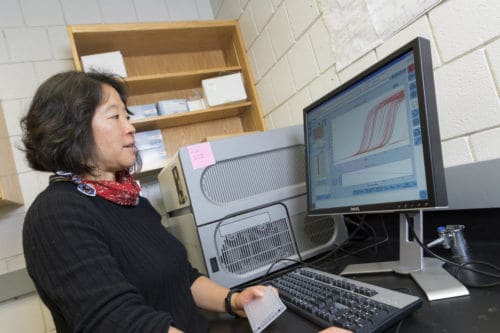A surprising new finding about gene expression could increase our understanding of the aging process. Gene expression is the process by which the information contained within a gene becomes a useful product.
In a study published in the journal “Nucleic Acids Research,” Ithaca College Associate Professor of Biology Maki Inada and a group of students found that alterations to the enzyme RNA polymerase II had a significant effect on telomeres, which are known to play a role in the aging of cells.
“The integrity of the telomeres is definitely related to whether they are packaged correctly, and it does seem like we’re seeing a change in the packaging state,” said Inada.
Inada and her group made mutations to RNA polymerase II — an enzyme involved in reading the genetic code — to see how these changes affected splicing and ultimately the expression of genes. The research plan made perfect sense, but when the results started to roll in, something was amiss: Their alterations to RNA polymerase II had no impact on splicing at all. “It was quite disappointing at first,” Inada recalls.
Their initial frustration quickly fell away when they realized that a dramatic change had indeed occurred somewhere else. “We noticed that there were a lot of genes that were located near the ends of the chromosomes, which are called telomeres, and these genes were highly expressed compared to the other genes,” Inada describes. “It was something that we didn’t expect, and something that was kind of cool.”
In a nutshell, the genetic code is distributed among a set of thread-like chromosomes, each of which is shaped somewhat like an “X,” and each arm of the X is tipped with a telomere made of tightly packed material, known as chromatin.
“Instead of affecting splicing like we thought they were going to do, we think these mutations might actually be affecting how well that chromatin is packaged at the telomeres,” said Inada.
This new understanding of gene expression invites speculation about potential implications for the aging process. Telomeres get shorter as a person gets older, and this causes cells to age and function improperly, which can lead to failing health.
“We haven’t investigated whether there’s a direct connection with aging, but that would be an interesting direction as a follow-up,” said Inada.
For now, her lab is focusing on the more fundamental question of the mechanism behind the gene expression at the telomeres, and is also continuing its work on splicing. She is doing some of this work in collaboration with other research groups at Cornell University, Weill Cornell Graduate School of Medical Sciences, Memorial Sloan-Kettering Cancer Center and the University of California, San Francisco.
Ruby Benn, one of the students involved in the research, graduated from Ithaca College in 2015 and is now studying to become a doctor at the Indiana University School of Medicine. She says that her experience helping with Inada’s research has proven beneficial.
“It taught me a lot of patience and to be open-minded, because what you expect to see may be completely different from the results you get,” said Benn.


